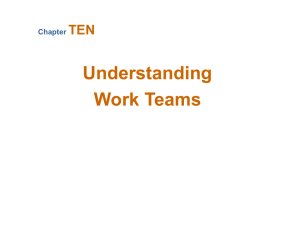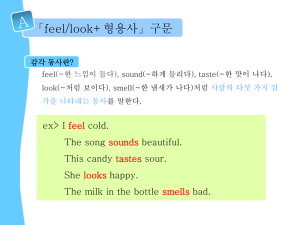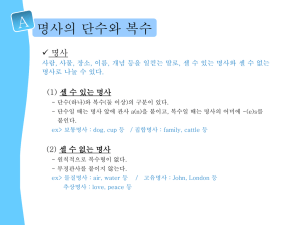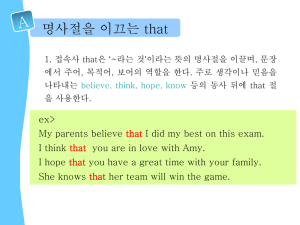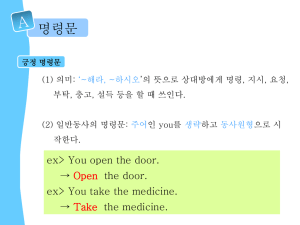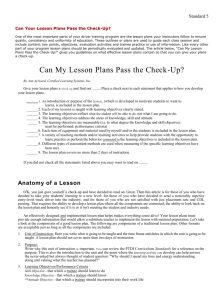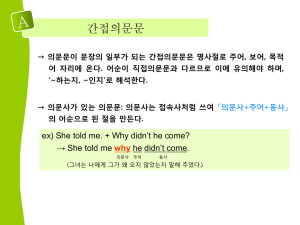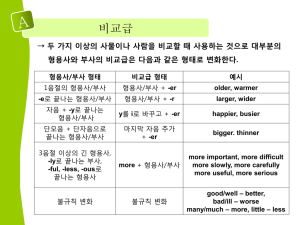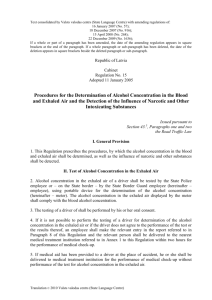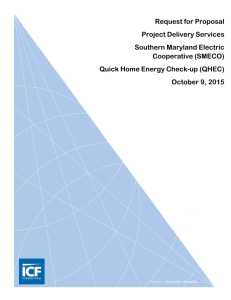A. 과거완료 - YBM T.edu
advertisement
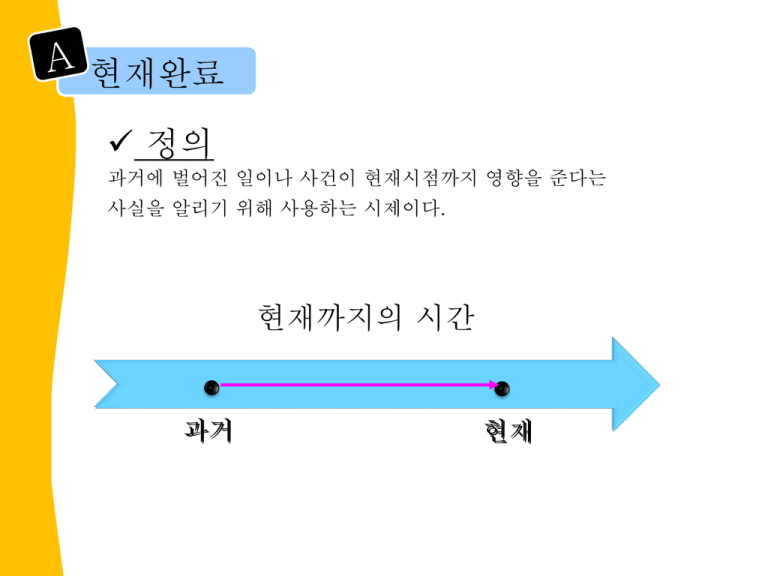
현재완료 정의 과거에 벌어진 일이나 사건이 현재시점까지 영향을 준다는 사실을 알리기 위해 사용하는 시제이다. 현재까지의 시간 과거 현재 형태 1 현재완료 긍정형 : 주어 + have / has + 과거분사 Mary isn't here. She has just left. 2 현재완료 부정형 : 주어 + have /has + not + 과거분사 I haven't seen her since 1983. 3 현재완료 의문형 : Have / Has + 주어 + 과거분사 ~? Have you had a vacation this year? Yes, I have. / No, I haven't. 현재완료의 4가지 용법 1 경험: 과거에서부터 현재까지 겪었던 주어의 경험을 말할 때 사용 되며 주로 ‘~한 적이 있다’라고 해석한다. 주로 같이 쓰이는 부사 : ever, never, often, many times,… 등Have you ever eaten Thai food? I have often seen Seoul Tower in Seoul. 2 완료: 주어가 과거에 시작한 일이 현재에 막 완료된 것을 나타내며 ‘(이미, 막, 최근) ~했다, ~해 버렸다’로 해석한다. 주로 같이 쓰이는 부사: just, already, yet, recently, lately 등 He has just finished his homework. Have you written a letter yet? 현재완료의 4가지 용법 3 결과: 과거에 일어났던 일이 현재까지도 똑같은 결과로 남아 있음을 나타낼 때 사용하고 주로 ‘~한 상태이다(그 결과 지금은 ~하다)’라고 해석한다. He has gone to school. (=He went to school, so he is not here) 4 계속: 주어의 행위가 과거에서부터 현재까지 계속되고 있으며, 특히 현재에 도 계속될 가능성이 있는 경우에 사용되며, 주로 ‘~해오고 있다, 계속 ~하 고 있다’로 해석한다. 같이 쓰이는 부사구→ for+기간, since+과거시점 등 I have studied English for two years. She has lived in New York since 1980. Check-up 다음 문장의 시제가 올바르면 T, 틀리면 F로 표시하고, 틀린 부분을 바르게 고쳐 봅시다. 1 The plane has just taken off from Incheon International Airport. ( ) 2. How many classes have you had so far today? ( ) 3. Alice has gone to the party last Saturday night. ( ) 4. I can't find my cell phone. Have you seen it? ( 5 Mozart has written more than 600 pieces of music. ( ) ) Check-up 다음 문장의 시제가 올바르면 T, 틀리면 F로 표시하고, 틀린 부분을 바르게 고쳐 봅시다. 1 The plane has just taken off from Incheon International Airport. ( ) T 2. How many classes have you had so far today? ( ) went 3. Alice has gone to the party last Saturday night. ( 4. I can't find my cell phone. Have you seen it? ( wrote 5 Mozart has written more than 600 pieces of music. ( F) T F ) ) T Check-up 괄호 안의 말을 현재완료형으로 바꾸고 보기에서 같은 용법을 고르시오. 보기 a. They have just built the sandcastle. b. I have taught him English for two months. c. She has never bought books on the Internet. 6. She (eat) Thai food once. → 7. I (already read) the book. → 8. Someone (just break) the window. → 9. I (know) him since he was a student. → Check-up 괄호 안의 말을 현재완료형으로 바꾸고 보기에서 같은 용법을 고르시오. 보기 a. They have just built the sandcastle. b. I have taught him English for two months. c. She has never bought books on the Internet. 6. She (eat) Thai food once. → has eaten - c 7. I (already read) the book. → have already read - a 8. Someone (just break) the window. → has just broken - a 9. I (know) him since he was a student. → have known - b 가정법 과거 정의 현재 사실을 반대로 가정해 보거나, 실제로 일어날 수 없는 일을 상상할 때 사용하는 표현으로 ‘만약~하다면, ...할 텐데.’의 의미 이다. 현재 사실의 반대를 말하는데 가정법 현재가 아닌 과거라고 하는 이유는? 현재사실에 반대되는 가정법을 현재 시제를 그대로 사용한다면, 글을 읽는 사람이나, 말을 듣고 있는 사람이 지금 있는 사실을 이야기하는지, 가정해서 이야기하는지 구분 할 수가 없다. 그래서 현재 사실이 아니라 는 것을 표현하기 위해, 현실에서 한 발짝 물러난 과거 시제를 써서 표 현한다. 형태 1 if절에 be 동사가 사용된 경우 「If+주어+were ~, 주어+과거형 조동사(would, should, could, might)+동사원형...」 If I were a bird, I would fly to you. If he were rich, he might buy it. 2 if절에 일반동사가 사용된 경우 「If+주어+과거형 동사 ~, 주어+과거형 조동사(would, should, could, might)+동사원형...」 If he understood me, I could try. If she heard the news, she would be sad. Check-up 주어진 단어를 이용하여 문장을 완성해 봅시다. 1. If you got more exercise, you __________________________ much better. (feel) 2. She ____________________ very upset if you _____________ the present that she gave to you. (be / lose) 3. He __________________________ more books if he _____________ more time. (read / have) 4. If you _________ ______________ in my position, what ? (be / do) _______________ you Check-up 주어진 단어를 이용하여 문장을 완성해 봅시다. 1. If you got more exercise, you would feel much __________________________ better. (feel) would____be 2. She _____________ _____ very upset if you lost the present _____________ that she gave to you. (be / lose) would read more books if he 3. He __________________________ hadmore time. _____________ (read / have) 4. If you were in my position, what ______________ do / do) (be would you _______________ _________ ? Check-up 다음 문장을 현재 사실과 반대되는 것을 가정하는 문장으로 다시 써 봅시다. 1. He isn't rich, so he can't buy all things he wants. → . 2. I won't call her because I don't know her phone number. → . 3. As Minhee doesn't live near her school, she is late for school. → . . Check-up 다음 문장을 현재 사실과 반대되는 것을 가정하는 문장으로 다시 써 봅시다. 1. He isn't rich, so he can't buy all things he wants. → If he were rich, he could buy all things he wants. . 2. I won't call her because I don't know her phone number. → If I knew her phone number, I would call her. . 3. As Minhee doesn't live near her school, she is late for school. → If Minhee live near her school, she would not be late for school. Check-up 다음 질문에 여러분 자신의 대답을 써 봅시다. 1. When do you feel angry? . 2. What would you do if you won the lottery? Check-up 다음 질문에 여러분 자신의 대답을 써 봅시다. 1. When do you feel angry? . (예시) somebody ignored me. 2. What would you do if you won the lottery? (예시) If I won the lottery, I would travel all around the world.
